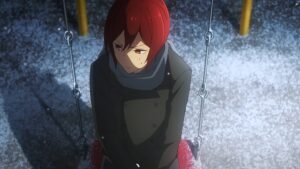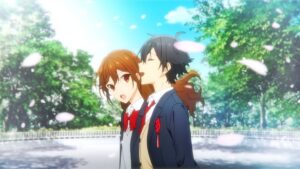Horimiya’s penultimate episode served as yet more evidence that the show values individual moments over any overarching story. The second half of this one jumped between characters on Christmas night without the use of formal scene transitions, and although it wasn’t hard to follow, it wasn’t as cozy as you might expect a holiday episode to be. There were some very weird scenes in here – why would Yanagi offer to buy Yuki’s older sister contacts when he’s only spoken to her twice in his life? What was the point of giving Remi an insect collection for Sengoku to be afraid of? Thankfully, this strangeness was balanced with warmth (Shu laying out a feast for his little sister, Shindo asking his girlfriend to wait for him until he graduates), which made the shifts in perspective easier to handle. Less tolerable was the weekly A-story, in which Ishikawa attempted to conceal his not-girlfriend from the nosy housekeeper – a Nickelodeon sitcom plot if ever there was one.
Even that terrible concept can be forgiven, though, thanks to a breakthrough moment for the anime’s actual couple. Hori and Miyamura had been playing second fiddle to their friends for the past few episodes, but that certainly changed last week – there’s nothing like a marriage proposal to propel you to #1 on a show’s list of priorities. It wasn’t extensively planned or particularly romantic (an apron from your part-time job isn’t the best proposal outfit), but I suppose that’s what made it feel Miyamura-esque. The kid’s got a pretty big hole in his heart – a fact that the Horimiya has admirably kept in focus despite its penchant for levity – and at this point in his young life, marriage must seem like the surest solution to that issue. It probably sounds like I’m trivializing his decision, but the truth is that it fits his character. Hori took the first step by confessing her desire to stay together after graduation, but to respond with a proposal? I’ve no doubt Miyamura loves his girlfriend, but to jump to marriage so quickly reads like a shield against loneliness, at least to me.
The specter of that solitude was present in today’s finale, too, as Miyamura envisioned a world where he’d stayed a loner in high school, and all his friends passed like strangers in the halls. I tend to enjoy these sorts of windows into alternate universes, and this was no exception. The show even got a bit experimental with its aspect ratio, narrowing the screen both horizontally and vertically at different points to highlight feelings of isolation and emptiness. These techniques went over pretty well during my viewing, as they were reserved for specific shots rather than dominating the screen for upwards of three minutes. Miyamura’s rooftop conversation with his alternate self was my favorite of the three (?) throughout the series, too – the tinge of resentment in Gloomymura’s voice as he promised to disappear made it clear that he’s not truly gone. The show may have ended on a sunny note, as any romcom should, but that doesn’t mean the ‘other Miyamura’ was just a gimmick; rather than being from another timeline, he was a representation of the negativity and self-doubt that still live inside his real-world twin.
I think that’s why it was so important that Hori’s fragility was acknowledged during Miyamura’s final voiceover. She’s no stranger to pain, either – her parents’ periodic absences required her to grow up fast, caring for Souta and shouldering the question of why Mom and Dad couldn’t make time for her. The truth is that both Hori and Miyamura have been deeply hurt in the past, which is a large part of what binds them together. The series hasn’t always done the best job of exploring this, but its final monologue is proof that it never forgot. In fact, I much prefer Miyamura’s rhapsodic waxing here to his proposal from the previous episode – both his recognition of her weakness and his gratitude for her strength had me feeling great as I realized that the show was about to nail the ending. And it totally did! Circling back around to its main pairing and giving them a heartfelt sendoff, rooted not in sentimentality but in genuine emotion, was an excellent decision. I didn’t love this show, but I loved its conclusion, and in a world full of bad anime endings, sometimes that’s enough.
[A final post on Horimiya will be coming… eventually! Between impressions of all the spring 2021 premieres and another project I’m planning, it’ll probably be a week until the review arrives. See you then.]





This has been a choppy adaptation, but it still captured the spirit of the manga, which is really one of those things you could call an ending on almost any chapter the more it goes on.
I think Hori’s general crankiness and insecurities by the way is explainable and justified by her situation.